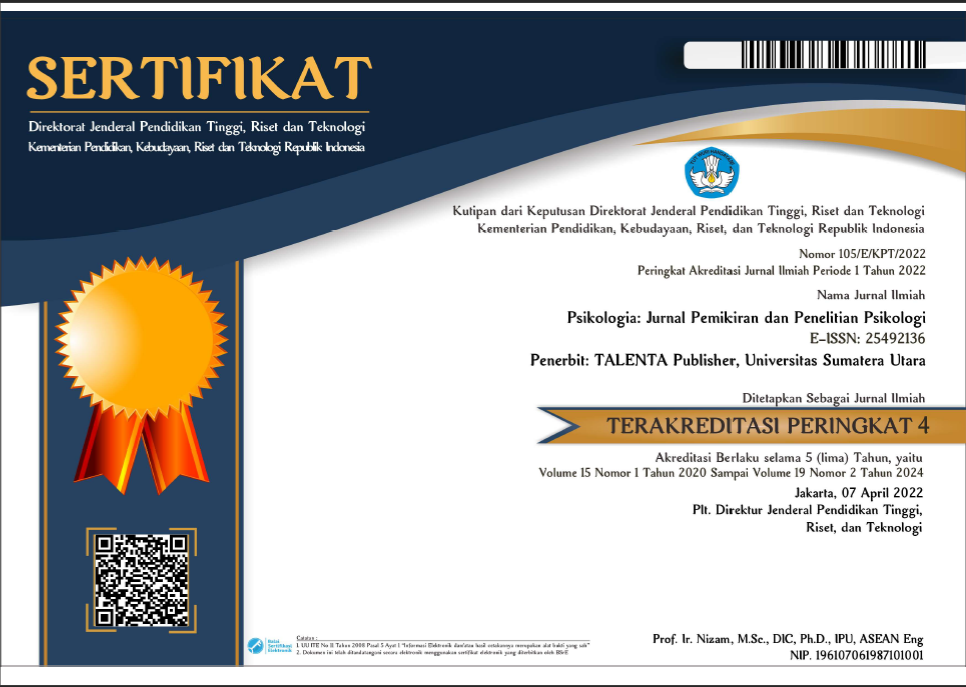The Personal growth on adolescent sexual abuse offender who have passed the detention period
Gambaran personal growth pada remaja pelaku kekerasan seksual
DOI:
https://doi.org/10.32734/psikologia.v18i1.10154Keywords:
sexual abuse, personal growth, adolescentAbstract
Adolescents who believe that they can change are more open to learning, willing to confront challenges, and able to rise from failing, which means personal growth. This research aims to know the process of personal growth in adolescent sexual abuse offenders. The method that was used is qualitative with a phenomenology approach and using the interview as a data collection method. The result of this research describes the personal growth of adolescent sexual abuse offenders marked with three themes of personal growth starting the change, feeling the dissonance, and reorganizing the experience. The personal growth that surfaced is influenced by family, experience, and spiritual factors.
Downloads
References
Amaliyasari, Y., & Puspitasari, N. (2008). Perilaku seksual anak usia remaja di sekitar lokalisasi dan faktor yang mempengaruhi. Jurnal Peneliti. Din. Sos, 7(1), 54-60.
Anggreiny, N., Sari, S.M., & Aziza, A. (2016). Psychological mechanism in adolescent sexual offenders. Jurnal Pemikiran & Penelitian Psikologi, 11(3), 112-122.
Annisa, F. (2017). Penegakan hukum terhadap anak yang melakukan tindak pidana pencabulan dalam konsep restorative justice. Jurnal Hukum, 7(2), 202-211.
Bauer, J.J., & McAdam, D.P. (2004). Personal growth in adults’ stories of life transitions. Journal of Personality, 72(3), 573-602.http://doi.org/10.1111/j.0022-3506.2004.00273.x
Bodla, G. M., Saima, W., & Ammara, T. (2012). Social support and psychological wellbeing among parents of intellectually challenged children. International Journal of Rehabilitation Sciences, 7(2), 29-35.
Dewi, K.S. (2012). Kesehatan mental. Semarang: CV. Lestari Mediakreatif.
Duffy, K.G., & Atwater, E. (2005). Psychology for living: Adjustment, growth, and behavior today: 8th edt. Upper Saddle River: Pearson Prentice Hall.
Hilman, D.P., & Indrawati, E.S. (2017). Pengalaman menjadi narapidana remaja di Lapas Kelas I Semarang. Jurnal Empati, 7(3), 189-203.
Hurlock, E.B. (1980). Psikologi perkembangan: Suatu pendekatan sepanjang rentang kehidupan. Jakarta: Erlangga.
Kahija, Y. L. (2017). Penelitian fenomenologis, jalan memahami pengalaman hidup. Yogyakarta: Penerbit PT Kanisius.
Kern, D. E., Wright, S. M., & Carrese, J. A. (2001). Personal growth in medical faculty: A qualitative study. Western Journal of Medicine, 175(2), 92. http://doi.org/10.1136/ewjm.175.2.92
Kirsh, S.J., Duffy, K.G., & Atwater, E. (2014). Psychology for living: Adjustment, growth, and behavior today: 11th edt. Upper Saddle River: Pearson Prentice Hall.
Mohammad, M., Mokhtar, H.H., & Samah, A.A. (2011). Person-centered counseling with malay clients: Spirituality as an indicator of personal growth. Procedia Social and Behavioral Sciences, 30, 2117-2123. http://doi.org/10.1016/j.sbspro.2011.10.411
Monteiro, S., Torres, A., Morgadinho, R., & Pereira, A. (2013). Psychosocial outcomes in young adults with cancer: Emotional distress, quality of life and personal growth. Archives of Psychiatric Nursing Journal, 27(6), 299-305. http://dx.doi.org/10.1016/j.apnu.2013.08.003
Morsunbul, U. (2016). The relations between personal growth initiative and identity styles among youth. The Online Journal of Counseling and Education, 5(3), 31-38.
Moustakas, C. (1994). Phenomenological research methods. U.S: Sage Publication.
Mystakidou, K., Tsilika, E., Parpa, E., Kyriakopoulos, D., Malamos, N., & Damigos, D. (2008). Personal growth and psychological distress in advanced breast cancer. The Breast Journal, 17(4), 382-386. http://doi.org/10.1016/j.breast.2008.01.006
Poerwandari, E.K. (2011). Penelitian perilaku manusia. Depok: LPSP3 UI.
Robitschek, C. (1998). Personal growth initiative: The construst and its measure. Measurement & Evaluation in Counseling & Development, 30(4), 183-198.
Robitschek, C., & Kashubeck, S. (1999). A structural model of parental alcoholism, family functioning, and psychological health: The mediating effects of hardiness and personal growth orientation. Journal of Counseling Psychology, 46, 159–172.
Robitschek, C., & Keyes, C.L.M. (2009). Keyes’s model of mental health with personal growth initiative as a parsimonious predictor. Journal of Counseling Psychology, 56(2), 321–329.
Rochmah, K.U. & Nuqul, F.L. (2015). Dinamika psikologis anak pelaku kejahatan seksual. Jurnal Psikologi Tabularasa, 10(1), 89-102.
Ryff, C. D. (1989). Happiness is everything, or is it? Explorations on the meaning of psychological well-being. Journal of Personality and Social Psychology, 57(6), 1069.
Ryff, C. D., & Singer, B. (1996). Psychological well-being: Meaning, measurement, and implications for psychotherapy research. Psychotherapy and Psychosomatics, 65(1), 14-23. https://doi.org/10.1159/000289026
Sampurna, A.W. & Suteki. (2016). Penyidikan terhadap anak sebagai pelaku tindak pidana pelecehan seksual oleh penyidik unit PPA satuan Reskrim berbasis keadilan restoratif di Kabupaten Kendal. Jurnal Law Reform, 12(1), 145-167.
Semium, Y. (2006). Kesehatan mental 1. Yogyakarta: PT. Kanisius.
Suyanto, B. (2002). Tindak kekerasan terhadap anak: Masalah dan upaya penanganannya. Surabaya: Kerjasama LPA Jatim dan UNICEF.
Tampubolon, E.L. (2017). Efektivitas pembinaan narapidana anak di Lembaga Pembinaan Khusus Anak Pekanbaru. Jom VISIP, 4(1), 1-14.
Yakunina, E.S., Weigold, I.K., & Weigold, A. (2013). Personal growth initiative: Relations with acculturative stress and international student adjustment. International Perspectives in Psychology: Research, Practice, Consultation, 2(1), 62–71.
Downloads
Published
How to Cite
Issue
Section
License
Copyright (c) 2023 Psikologia: Jurnal Pemikiran dan Penelitian Psikologi

This work is licensed under a Creative Commons Attribution-ShareAlike 4.0 International License.








